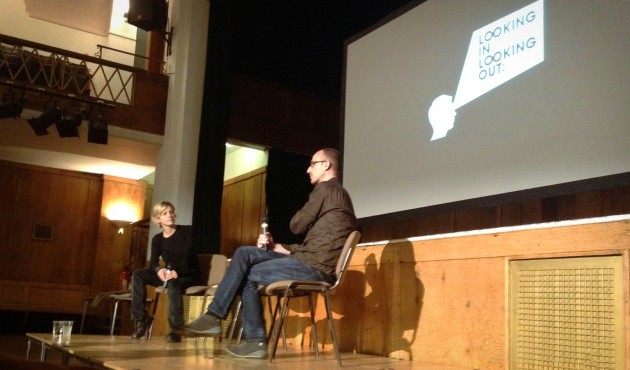The Philosophy of Man In A Cat

On Wednesday Man In A Cat had the indulgent pleasure of being discussed and having the philosophy of it explored by Carla MacKinnon & Scott Biagi as part of the Looking In, Looking Out Film Festival.
I was mainly interested in what they had to say because there is actually some philosophy among all the poo jokes, which is why the film equally gets remarked as “disturbing” and “heartwarming”.
Here’s them chatting about it. Apologies for the Count Crapular filming. I arrived late so filmed surreptitiously from the back of the hall. That’s me calling out at the end like a jilted lover at a wedding. I went on stage and chatted some more about the philosophy behind the film, but stupidly didn’t record the audio.
On stage I was given a quick checkover to make sure no one was in my eye and then I gave my account of things.
One of the starting points for making Man In A Cat into a proper story was actually Plato’s Allegory of the Cave (Yeah, we got Greek on this shit). That idea being that if someone was shackled facing the wall of a cave and had only ever seen the shadows of real things, how would they deal with seeing the real world, and then how would he be received by people who live like he used to. Man In A Cat definitely isn’t as mind bending as that, but by living through the eyes of something else he is living behind a glaze and is going to struggle to adapt otherwise.
Man In A Cat is also a bit of a statement on love. You can be in love without finding a soulmate, every relationship isn’t perfect and often people are drawn to people they’re not compatible with. Yorkie only really gets with Susan because she’s one of his kind and awakens some sympathy in him. They’re purposefully not shown as being happily-ever-after because, as Carla put it, relationships made in traumatic situations don’t last.
So you see, every one of those anus jokes was just mis-direction… They weren’t… Or were they?… No.
Anyway, I enjoyed myself. The atmosphere at the screening was made particularly friendly and curious by the fact that most of the films had at least an element of comedy about them. Which I think was a really clever turn, initially because it feels absurd, but then because you realise that comedy can carry a lot of weight and that’s what makes comedy so special.
Scott Biagi also looks EXACTLY like Robert Popper.